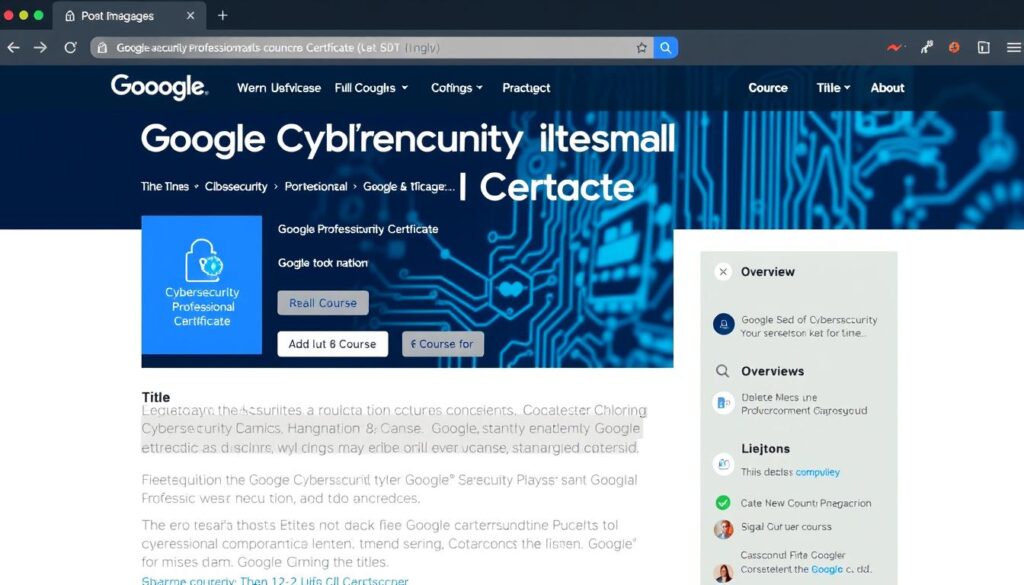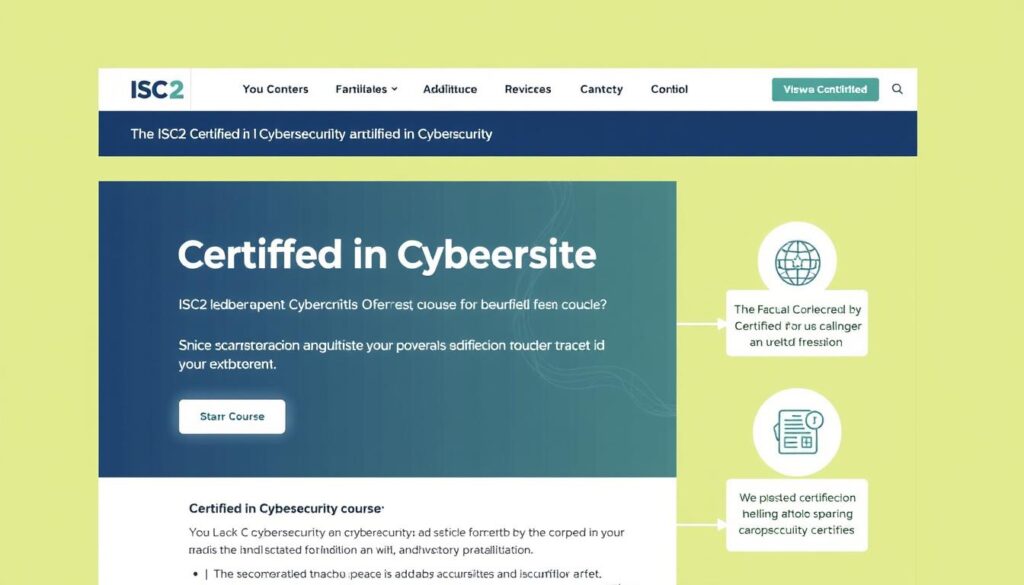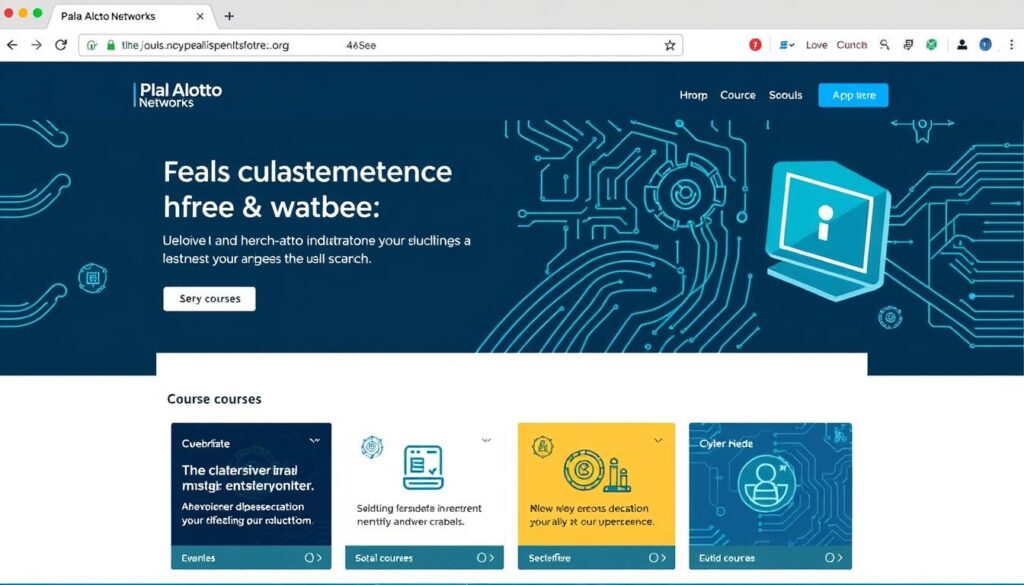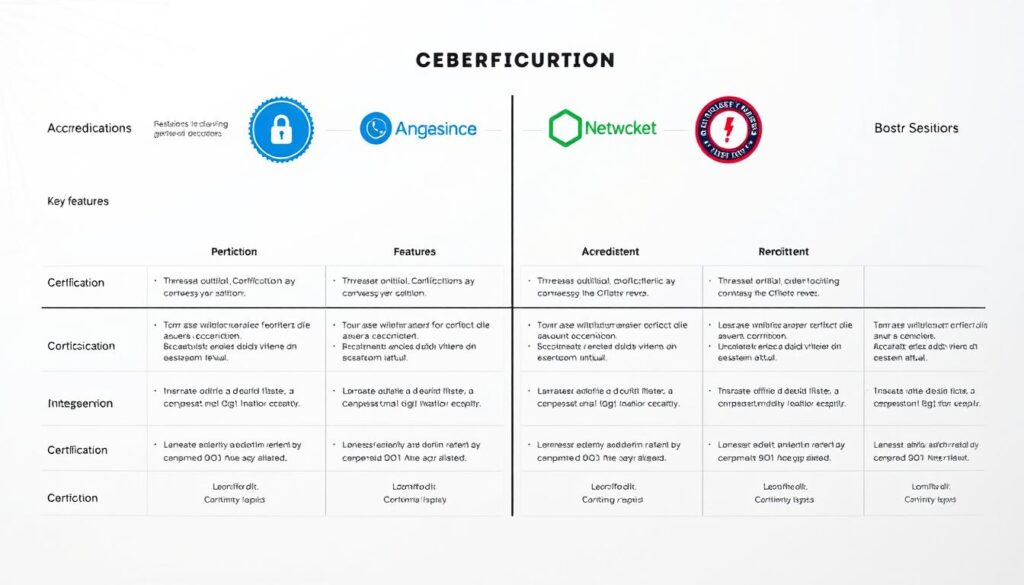The demand for cybersecurity professionals is skyrocketing, with the U.S. Bureau of Labor Statistics projecting a 32% increase in demand over the next few years. This growth rate is much faster than the average job growth rate, making cybersecurity one of the most in-demand skills across all industries.
As organizations desperately seek qualified professionals to protect their digital assets, cybersecurity skills have become increasingly crucial in today’s digital landscape. You can now acquire these skills without financial investment by taking advantage of free online courses that provide valuable certificates upon completion.
Key Takeaways
- Learn about three completely free online cybersecurity courses that offer certificates.
- Understand why cybersecurity skills are crucial in today’s digital landscape.
- Discover how these free courses compare to their paid counterparts.
- Explore the specific content and certification processes of each course.
- Learn about the career benefits these courses offer to help you make an informed decision.
Understanding Cybersecurity and Its Growing Importance
The rapidly evolving cyber threat landscape has made cybersecurity a critical concern for organizations worldwide. As technology advances, the importance of protecting sensitive information and securing systems from malicious attacks has become paramount.
What Is Cybersecurity?
Cybersecurity encompasses the practices, technologies, and processes designed to protect networks, devices, programs, and data from attacks, damage, or unauthorized access. It involves safeguarding personal information, such as account data, passwords, and personal identifiers, from being compromised.
- Cybersecurity protects against various types of malicious attacks, including spyware, viruses, and other intruders.
- The field has evolved significantly, from simple password protection to complex defense systems.
- It guards against sophisticated threats like ransomware, phishing, and zero-day exploits.
Why Cybersecurity Skills Are in High Demand
The cybersecurity industry is experiencing unprecedented growth due to increasing digitization, the rise of remote work environments, and the growing sophistication of cyber threats. As organizations rely more heavily on digital infrastructure, the potential impact of security breaches has grown exponentially.
- Information security professionals are tasked with preventing attacks and developing response protocols.
- The expanding threat landscape includes nation-state actors, organized crime groups, and hacktivists.
- The integration of IoT devices, cloud computing, and AI technologies has expanded the attack surface for potential cyber threats.
This growing demand for skilled cybersecurity professionals is driven by the need to protect against increasingly complex and frequent cyber attacks.
Cybersecurity as a Lucrative Career Path
With the increasing threat of cyberattacks, the need for skilled cybersecurity professionals has never been more critical, creating a lucrative career landscape. The field of cybersecurity offers a wide range of career opportunities, from entry-level positions to leadership roles, making it an attractive option for individuals with various backgrounds and interests.
Popular Cybersecurity Job Roles
The cybersecurity industry encompasses diverse job roles, each with unique responsibilities and requirements. Some of the popular positions include Cybersecurity/information security analyst, Cybersecurity engineer, and Cybersecurity consultant. Other roles such as Penetration tester, Incident responder, and Chief Information Security Officer (CISO) are also in high demand. These roles not only offer challenging work but also provide opportunities for career growth and professional development.
- Cybersecurity analyst roles provide a foundation for career growth.
- Specialized roles like penetration tester offer opportunities for those with specific technical skills.
- Leadership positions such as CISO represent the upper echelon of the career ladder.
Salary Potential in the Cybersecurity Field
The salary potential in cybersecurity is significant, with various factors influencing compensation. According to Salary.com estimates, an ethical hacker’s average salary in the U.S. is $110,184, while a cybersecurity consultant can earn around $135,000. At the higher end of the scale, a CISO can make an average of $244,000. The industry-wide talent gap has driven up compensation and improved job security for cybersecurity professionals.
The field’s continuous evolution ensures that cybersecurity careers offer ongoing learning opportunities and challenges. As a result, professionals in this field can expect not only financial rewards but also personal and professional growth.
3 Free Online Cybersecurity Courses With Certificates In 2024
In 2024, you can boost your cybersecurity career with three free online courses that offer certificates upon completion. These courses are designed to equip you with the skills and knowledge needed to succeed in the cybersecurity industry.
Google Cybersecurity Professional Certificate
The Google Cybersecurity Professional Certificate is an excellent starting point for beginners. This comprehensive course covers essential topics such as Python programming, Linux, SQL, and security fundamentals.
Course Overview and Content
The Google Cybersecurity Professional Certificate is designed to be accessible to those with no prior experience. The course content includes cybersecurity practices, threats, and vulnerabilities, as well as hands-on training in Python, Linux, and SQL.
You will learn how to apply security principles to protect networks and systems from cyber threats. The course is available on Coursera and can be completed at your own pace.

Certification Process and Requirements
To earn the Google Cybersecurity Professional Certificate, you must complete the required coursework and pass the assessments. The certification is free for those who qualify for financial aid on Coursera.
Upon completion, you will receive a certificate that can be shared on your LinkedIn profile, enhancing your credibility with potential employers.
Career Benefits After Completion
Completing the Google Cybersecurity Professional Certificate can significantly improve your job prospects. You will have the skills and knowledge needed to pursue entry-level cybersecurity positions, and the certificate demonstrates your commitment to the field.
ISC2’s Certified in Cybersecurity
ISC2’s Certified in Cybersecurity program offers industry-recognized credentials from one of the most respected organizations in the field. This certification covers five critical domains: security principles, business continuity, disaster recovery & incident response, access controls, network security, and security operations.
Course Structure and Topics Covered
The Certified in Cybersecurity training is designed to provide a well-rounded foundation for cybersecurity careers. The course covers a broad range of topics, including network security, threat management, and incident response.
You will gain a comprehensive understanding of cybersecurity principles and practices, preparing you for a career in the field.

Certification Requirements and Exam Details
To become certified, you must pass the ISC2 Certified in Cybersecurity exam. The exam is free of charge for a limited time, and the only cost is a $50 annual membership fee after passing.
The certification is valid for a certain period, after which you will need to maintain it through continuing education requirements.
Industry Recognition and Value
The ISC2 Certified in Cybersecurity certification is highly regarded in the industry, demonstrating your expertise and commitment to cybersecurity. It can significantly enhance your career prospects and open up new opportunities.
Palo Alto Networks Free Cybersecurity Education Courses
Palo Alto Networks provides free educational courses that focus on practical skills related to their technologies, including cloud security and Security Operations Center (SOC) fundamentals.
Available Course Options
The Palo Alto Networks free cybersecurity education courses cover a range of topics, including network security, cloud security, and SOC fundamentals. You can choose the courses that best fit your career goals and interests.

PCCET Certification Process
Upon completing the Palo Alto Networks courses, you can earn their Certified Cybersecurity Entry-level Technician (PCCET) certification. The PCCET certification demonstrates your proficiency with industry-standard security tools and concepts.
The certification process involves completing the required coursework and passing the PCCET exam.
Skills You’ll Develop
The Palo Alto Networks courses are designed to provide hands-on learning experiences through labs, simulations, and practical exercises. You will develop real-world skills valued by employers, including network security, cloud security, and SOC operations.
How These Free Certifications Compare to Paid Options

As you navigate the world of cybersecurity certifications, it’s essential to weigh the benefits of free versus paid options. The decision between pursuing a free certification or investing in a paid one depends on various factors, including your career goals, current experience level, and the specific skills you aim to acquire.
Value Proposition of Free vs. Paid Certifications
Free cybersecurity certifications, such as those offered by Google, ISC2, and Palo Alto Networks, provide a valuable entry point into the field. These programs are particularly beneficial for individuals new to cybersecurity, offering foundational knowledge and practical skills. On the other hand, paid certifications like Certified Information Systems Security Professional (CISSP) and CompTIA Security+ offer more advanced and specialized knowledge, particularly in areas like risk management, governance, and compliance.
The primary difference between free and paid certifications lies in their depth of coverage and specialization. While free certifications excel at teaching practical, hands-on skills, paid options often focus on theoretical frameworks and information security management principles. Many professionals start with free certifications to build a foundation before investing in paid options that align with their career goals.
Employer Recognition of Free Certifications
Employers are increasingly recognizing the value of free certifications from reputable organizations. These certifications demonstrate a candidate’s commitment to acquiring relevant skills and knowledge. While paid certifications like CISSP ($749) and CompTIA Security+ ($392) carry significant industry weight, free alternatives are becoming more respected as they provide legitimate credentials.
The recognition of free certifications has grown substantially as major tech companies invest in developing quality educational content. For roles requiring specialized knowledge, paid certifications may still provide an edge. However, many organizations value a combination of credentials, practical experience, and problem-solving ability, making free certifications a valuable component of a cybersecurity professional’s profile.
Getting Started with Your Cybersecurity Learning Journey

To get started with your cybersecurity learning journey, it’s essential to understand the recommended prerequisites and how to create an effective learning plan. With the abundance of free online resources, short-term courses, and boot camps available, you can learn cybersecurity on your own and at your own pace.
Recommended Prerequisites and Background
While no specific technical background is required to begin learning cybersecurity, familiarity with basic computer concepts, network fundamentals, and operating systems can significantly accelerate your progress. For complete beginners, consider spending a few weeks learning foundational IT concepts before diving into security-specific content.
Understanding what you’re protecting is crucial to effective cybersecurity practice. This foundational knowledge will help you grasp more advanced concepts, such as network security and ethical hacking.
Creating an Effective Learning Plan
Creating a structured learning plan is essential. Start with broad cybersecurity principles before exploring specialized areas like malware analysis or penetration testing. Supplement your formal course learning with hands-on practice through virtual labs and capture-the-flag competitions.
Joining cybersecurity communities and staying current with the latest threats and cyber news will also enhance your learning journey. By balancing theoretical knowledge with practical skills, you’ll be well-prepared for a career in this field.
Conclusion
By exploring the free cybersecurity courses discussed here, you can take the first step towards a rewarding career. The three highlighted programs offer certificates upon completion, providing a legitimate pathway into the cybersecurity industry. These free courses equip you with in-demand skills, enhancing your job prospects. As you invest your time in these online learning opportunities, you’ll be well-positioned for a career with excellent growth potential. Effective management of cyber threats is crucial, and your newfound skills will contribute to a safer digital world.
FAQ
What are the benefits of taking a cybersecurity course?
By taking a cybersecurity course, you’ll gain the skills and knowledge needed to protect computer systems, networks, and data from cyber threats and malware. This can lead to a rewarding career in the field of information security.
Are these certifications recognized by employers?
Yes, the certifications offered by Google, ISC2, and Palo Alto Networks are well-respected in the industry and can be beneficial when applying for cybersecurity jobs.
Do I need prior experience in cybersecurity to take these courses?
No, these courses are designed for beginners and those looking to transition into a cybersecurity career. They cover the fundamentals of information security and risk management.
How long does it take to complete these courses?
The duration of the courses varies, but you can expect to spend several weeks or months completing them, depending on your pace and the specific course requirements.
Will these certifications help me get a job as a cybersecurity consultant or analyst?
While a certification alone is not a guarantee of a job, it can certainly improve your chances of being hired as a cybersecurity consultant or analyst by demonstrating your expertise in network security and threat mitigation.
Can I learn about ethical hacking and penetration testing through these courses?
Yes, some of these courses cover topics like ethical hacking and penetration testing, which are essential skills for a cybersecurity professional.
Are there any prerequisites for taking these courses?
The prerequisites vary depending on the course, but generally, a basic understanding of computer systems and network fundamentals is recommended.
